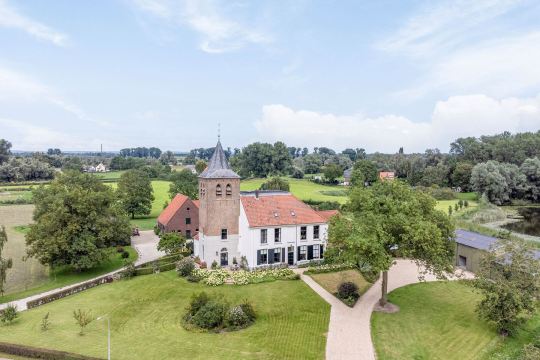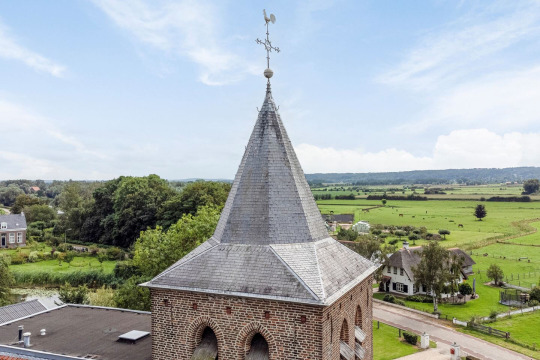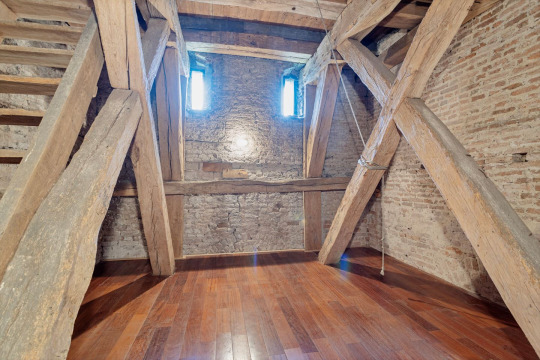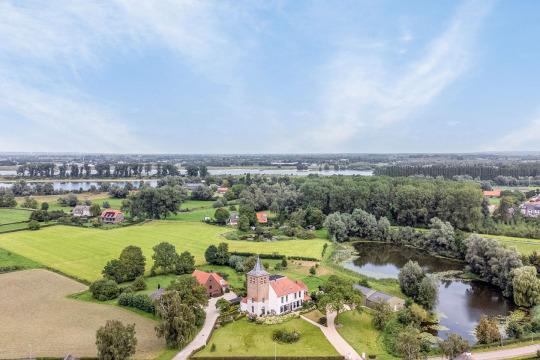#church conversion the netherlands
Text

Thanks to Ingek73 for finding this converted 16th cent. church conversion in the Netherlands. It's a 2 unit townhouse with 4bds, 2.5ba, € 1,050,000 kk / $1.125M + € 150/$161 per mo. fee But, the best part is that the half with the bell tower is the one for sale. Plus, it comes with a resident barn owl!

This conversion is a combination of modern and later, plus historic church renos. This is an early c.1950s entrance hall - look at the terrazzo floor and archways. After a period of flooding in the first half of the 19th century, two houses were built in the nave of the church around 1860.


Unlike churches that are basically one huge space, this one is separated into rooms like this sunny open concept living/dining room.

But, look at what they left in this corner- an original ancient wall with remnants of a fresco. This is super cool.

Modern kitchen with what appears to be an original stone floor.

Modern powder room.

Original hallways from the earlier church reno were left intact.

Not sure if this is an office/dining room or an office/conference room, but I love the arched door to the garden.

Arched doors open to this lovely patio.


Beautiful details such as wall paintings from the early 16th century that have been professionally preserved and restored.


The original arch above is part of the modern principal bedroom.

Oooh, this would be my personal library.

Very modern baths.

To reach the tower, lift the trap door on the left. And, here we are. Is this getting cool or what?

Look at the ancient door.


Now, here we are up in the steeple. Note the rope for the bell tied around the beams on the right.

Cool AF.


In the basement I would have to make a rathskeller.

Gorgeous location.
#church conversion#church conversion 16th cen.#church conversion the netherlands#old house dreams#houses#house tours#home tour#submissions
87 notes
·
View notes
Text

A Colorful Church Conversion in The Netherlands
894 notes
·
View notes
Note
can you talk a bit more about weber (im refering to a post you made earlier today i think)? i know a bit about the protestant ethic theory but not really the historical context in which it was written nor how it's used today. thanks!
so, weber's argument is essentially that protestant (specifically calvinist and puritan) theology played a major causal role in the development of capitalism in northern europe following the reformation. his position was that protestant ethics, in contrast to catholicism, placed a high moral value on secular, everyday labour, but also discouraged the spending of one's wages on luxury goods, tithing to the church, or giving overmuch to charity. thus, protestants invested their money in business and commercial ventures instead, turning the generation of capital into a moral endeavour and venerating hard work and economic productivity as ways to ensure one's soul was saved (as the buying of indulgences was not an option for protestants).
this is a bad argument. at core it is idealist, subordinating an economic development to religious ideology. weber never explains how the actual, material economic changes he wants to talk about were effected by a set of ideas; he doesn't consider the possibility that the ideas themselves reflected in some way the material and economic context in which they were developed; he doesn't differentiate between protestantism as a causal factor in the development of capitalism, versus the possibility that capitalism and protestant conversion both resulted from some other factor or set of factors. <- these types of problems are endemic to 'history of ideas' aka 'intellectual history' because merely writing a history of the (learned, published) ideas circulating at a given time doesn't tell you jack about how and whether those ideas were actually implemented, how common people reacted to them or resisted them, what sorts of material circumstances the ideas themselves were formulated amidst, and so forth.
in the case of weber, it's very easy to poke holes in this supposed relationship between protestantism and capitalism. even in western europe alone, we could look at a country like france, which was quite catholic, never became predominantly or even significantly protestant, and yet also industrialised not long after, eg, the netherlands and england. we could also look at what historian michael kwass calls "court capitalism" in 18th-century france, which was a largely non-industrial form of capitalism that depended on the catholic king's central authority in order to ensure a return on investment. france at this time had a burgeoning luxury culture and a centralised, absolutist government that was closely entwined with the powerful catholic church—yet it also had economic development that is recognised as early capitalist, along with growing social and economic tensions between the nascent bourgeois and petit-bourgeois classes and the aristocracy. this is not even close to being the earliest example of capitalist or proto-capitalist economic development (some predates the reformation!), and again, this is within western europe alone—we could and should also point out that capitalism is not solely a european phenomenon and can and does coexist with other, radically different, religious ideology (i have problems with jack goody's work but this is something i think it can help elucidate).
weber argued that the 'spirit of capitalism' was no longer dependent on the protestant theology that had initially spawned it—but again, here we see issues with idealist methodologies in history. at what point, and how, does this 'spirit' become autonomous? what is it that has taken hold, if weber is not talking about the 'protestant ethic' itself and is also not interested in analysing the material changes that comprise capitalism except as effects of some underlying ideology? well, it's what he sees as a general shift toward 'rationalisation' and 'disenchantment' of the world, leading to an understanding of late 19th- and early 20th-century capitalism as a kind of spiritually unmoored servitude to mechanism and industry. this in turn relates back to weber's overall understanding of the legacy of the 'scientific revolution', which is another can of (bad) worms. there is a lot to say about these elements of weber's thought, but for starters the idea that europe was the progenitor of all 'scientific advancement', that it then simply disseminated such knowledge to the rest of the world (the apotheosis of the centre-periphery model, lmao), and that europe has become 'disenchanted', ie irreligious, as a result of such scientific advancement... is just patently bad analysis. it's eurocentric, chauvinistic, and simply demonstrably untrue in like twelve different ways.
anyway, when i see conservatives and reactionaries cite weber, i'm not surprised. his arguments are conservative (his entire intellectual paradigm in this text was part of his critique of marx and the premises of materialist / contextualist history). but when i see ostensible leftists doing it, often as some kind of dunk on protestantism (or christianity more generally, which is not even a good reading of weber's own understanding of catholicism), it's more irritating to me. i am not interested in 'leftisms' that are not materialist. weber's analysis is a bad explanation of how and why capitalism took hold; it doesn't even work for the limited northern european case studies he starts with because, again, idealist history fundamentally fails to explain how ideology itself creates material change. like, "some guy writes something down -> ??? -> everyone just agrees with him -> ??? -> stuff happens somehow" is not a good explanation of any phenomenon, lmao. if we are stuck on the idea that capitalism, a set of economic phenomena and real relations of production, is the result of ideology, then we will also be stuck trying to 'combat' capitalism on the ideological level. it's unserious and counterproductive. weber's analysis has retained an outsize position in the sociological historiography because it's an attractively simplistic, top-down, idealist explanation of both capitalism and protestantism that makes centuries worth of material changes to production forms into a kind of ideological coup ushering in an age of 'rationalism'. this is just not a text that tells us, leftists, anything politically useful. at best it is an explication of the internal psychological logics of (some) forms of protestantism in (some) places and contexts.
264 notes
·
View notes
Photo

The Most Beautiful Bookstore In The World - Selexyz Dominicanen Bookstore in Maastricht in the Netherlands is an incredible church conversion that was originally consecrated in 1294.
4 notes
·
View notes
Text
2023 post
i'm struggling through this with a kind of broken keyboard (sticky M U J keys) so bear with me!
because the last month of this year has been such a fucking nightmare (that i'll be working to remove myself from come tuesday) i realized that the good things that happened this year kind of escaped me.
cause--this year was good, in ways that as always with my life cannot be seen by the outside world. it was a messy year but some things changed that i still haven't fully made sense of.
-this year i met so many cool people on here, or got closer to some other people who i'd known before. if "meeting cool people on tumblr" was a skill you could put on your resume, i would definitely feel qualified to put it on my resume, but this year i feel like i just got acquainted with a really high quality group of people (all who support different teams, too!) and that's been so much fun and rewarding as well. i always feel a bit guarded telling people that i care about them but...i do. a lot!
-this june i went on a #YOLO trip to the netherlands that i could not afford but even now when i see my charming credit card debt i have to say i have No Regerts. i got to meet two of these tumblr friends who i've been close to for long enough that they've transcended "internet friend" for me and feel like Friends I've Known a Long Time. we had such a comfortable and fun time travelling together, to a place i've wanted to visit since i was young, and the benefit of meeting Tumblr Friends in real life is that you can make sure everyone's brain needs are taken care of! together we went to see italy beat NL (feat. virg van d slur in the flesh) in the stadium and then watched croatia lose to spain in the basement of a sports bar in utrecht and they got to see that it's 100% true that i cry during the croatian national anthem before the game 😂 i got to do so many bucket list things--visit the rijksmuseum, go solo to delft and see all the vermeer places and settings of my favorite book, girl with a pearl earring (and accidentally wander into a government building looking for a church, whoops), and see the girl with a pearl earring herself for the second time, but this time at her home in the mauritshuis. also i took a lot of fun trains and like every time i go from american Big Corn Syrup and Weird Additives food to europe, everything i ate was good as fuck. and i slept in a pod for two nights! i have the opposite of claustrophobia (claustro...philia? lol) so that slapped. so great, and getting to meet up with friends who live on the other side of an ocean is so fucking special.
-LAMPARDVERSE! nuff said, but it's been an absolute blast getting to co-create it and research all the lore. this is just the beginning, long may it live!!! also thanks to you all for putting up with me blasting a white english chelsea man on your dashes. it will happen again.
-irl stuff...the most unexpected. this year i was able to comfortably become friendly with people who are quite different from me. i was confident in the parts of my personality that are Different--i had fun owning it, and i saw that people really like that person. the craziest thing was that a huge obstacle in my path was that cptsd causes me to feel physically uncomfortable around people, even people i like, aside from emotional discomfort, but the thing is when your body is getting physical danger signals they're extremely difficult to "ignore" (for a reason!) or put aside to focus on the mental stuff.
this year i just went for it--went through months of extremely draining and uncomfortable "exposure therapy" by way of forcing myself to try to stay present in conversations with people i knew i liked, even if the conversations/their presence freaked me out and drained me. (i'm not some magical uwu inspiration/good luck miracle, for anyone who might be in this situation and feel envious--i've been in intense therapy since 2013, do a lot of my own mental work in between, and take two different medications. it took me 10 years to get there! i say this cause there is no shame in the hard work.) importantly, with the people i felt i trusted enough and whose opinion of me i valued enough for them to know the truth, i just told them what was going on with me. not in any graphic detail or TMI, but i told them one of the things that has a big impact on how i present to the outside world (i suffer from trauma), what this trauma suffering looks like to the outsider (sometimes i stop talking altogether in a conversation, and not just that, but i zone out so hard that it looks like i'm not even paying attention, even though sometimes i still am), and what it means about how i feel about them/how they should take it (it means nothing at all, so please please don't take it personally)
they took this level of openness and honesty very well, and i found that telling them these limitations of mine helped to set me free. not living with the lifetime fear of being "found out," not having to worry while i was having a Trauma Moment that people were thinking badly of me and that it was severely impacting my socialization--all of this suddenly helped me start staying in the present while talking to people and while people were talking to me. and not just stay in the present but--ENJOY it. get something out of it. and, to show my work-friends that even though i have a lot of things not in common with them--that that's cool, and we still have plenty of things we do have in common
the kindness people have shown me this year after Seeing Me and getting to know me was unreal. i don't know how to process it. (this applies to you guys on tumblr too!). so many things have happened this fall and so many things were said to me that i never, ever, EVER thought i would be able to experience. i hope this lasts and i hope i can build on this in the new year.
so yeah...this year was...something alright. i'm always an even age in an even year and the evens are never as good for me as the odds (other than like, age 14. that was a good time.) but let's hope for the best.
now, i hate new year's eve/day, so let's get this shit over with!
#originals#writing this with this wretched keyboard was a nightmare#macbook keys are just scary to remove! the last thing i need is an actually broken laptop lol
9 notes
·
View notes
Text
Dr Cassandra Joseph led the Otago study that unexpectedly revealed that tomboyism can be associated with trauma.
‘Tomboyism’ is often fondly celebrated by society as an accepted form of gender nonconformity but is not commonly associated with trauma.
However, that is the unexpected finding from a new University of Otago, Ōtākou Whakaihu Waka study published in the Journal of Gender Studies.
When Otago PhD graduate Cassandra Joseph set out to interview tomboys from a range of cultures about their experiences growing up, neither she nor the study participants anticipated the trauma and distress they had sometimes faced would feature strongly in their conversations.
“The media often paints tomboyism to be a carefree experience, with tomboys being heralded as ‘rebels’,” she says.
“Nobody associates tomboys with trauma.”
Dr Joseph interviewed 11 assigned-female-at-birth (AFAB) tomboys aged between ages 24 – 42 of various ethnicities and a range of gender identities from Aotearoa New Zealand, Australia, Canada, the Netherlands, Singapore and the United States.
As interviews progressed, it became clear that for study participants there was often a sense of unhealed trauma that came with discussing past or present tomboyism.
Some identified as tomboys as a form of self-preservation, while others were labelled with the term and experienced bullying or ostracisation.
One participant from Singapore described how in secondary school, male students would pull her skirt and say she looked ‘like a boy’, and the bullying became so bad she took up taekwondo to feel safe.
Another participant spoke of adopting a tomboy persona because her religious upbringing had taught her that within the church, women were deemed sinful by being desirable to men.
When she was 10 years old, two men attempted to assault her. By appearing as a tomboy, she felt she would be less desirable to men and therefore safer.
A transgender study participant noted the male privilege and increased sense of personal safety he experienced when he became male-passing - a sense of ‘brute strength’ that other participants also identified helped them feel safe.
The study suggests that in such cases, tomboyism has been used as a kind of self-preservation from “the leering eyes of the patriarchy”.
“While this is not the case for all tomboys, it is rather telling that AFAB people have to navigate gender norms to embody gender traits that make them feel safe,” Dr Joseph says.
For many of the participants, once they reached puberty they felt expected to conform to feminine conventions. Many struggled to reconcile their inherent tomboy nature and the expectations of society, resulting in a feeling of ‘gender melancholia’.
“To grow up feeling a sense of freedom that aligns with one’s tomboy identity only to have that stripped away during puberty and post-puberty is a trauma that has been previously unrecognised when it comes to the tomboy narrative,” Dr Joseph says.
She hopes the study might encourage the public to think critically about gender and to realise that the socially imposed binary of masculine/ feminine is more fluid than people might think.
“We also have a responsibility of care towards anyone who challenges our preconceived notions of gender.”
While the concept of tomboyism itself originated in the 16th century and was first used to describe unruly boys, over the years the term tomboy has “shapeshifted” and is bound to do so again in future, Dr Joseph says.
“There is a growing vocabulary around gender-nonconformity, and tomboyism has historically served as a stepping stone into more contemporary discussions on gender and sexuality.
“I think the concept of tomboyism will continue to remain a starting platform in the discussion of gender nonconformity, even if the term ‘tomboy’ isn’t as actively used in some contexts.”
source article
#research#tomboy#tomboyism#gender nonconforming#science#study#queer#feminism#feminist#https://www.otago.ac.nz/news/newsroom/depths-of-tomboy-trauma-revealed-in-study
2 notes
·
View notes
Text
Holidays 4.17
Holidays
American Academy of Arts and Letters Charter Day
Asia Asteroid Day
Bat Appreciation Day
Bay of Pigs Anniversary Day
Day of the Great Victory (Kampuchea)
Blah Blah Blah Day (a.k.a. Blah Blah Blah Memes Day)
Book Day (British Columbia, Canada)
Canterbury Tales Day
Children’s Protection Day (Japan)
Drunken Marathon Day
Ellis Island Family History Day
Emancipation Day (D.C.)
Equality Day (Canada)
Evacuation Day (Syria)
FAO Day (Iraq)
Feast of Random Walks
Fire Service Day (Kazakhstan)
Flag Day (American Samoa)
Ford Mustang Day
417 Day (Missouri)
Hex Sign Day
Horse Day
Hug a Cactus Day
International Day of Mastering Conversations That Matter
International Day of Peasants Struggle
International Ford Mustang Day
International Haiku Poetry Day
International Refrigeration Day
IU Day (Indiana)
Migration Service Employees Day (Turkmenistan)
National Day of Action for Higher Education
National Ellis Island Family History Day
National Go Orange Day
National Hickey Day
National Kickball Day
National 2A Day
No Limits For Deaf Children Day
Nosy Neighbor Appreciation Day
Nothing Like A Dame Day
Palestinian Prisoners’ Day
Pansy Day (French Republic)
Poetry and the Creative Mind Day
Roadway Worker Appreciation Day
Saint Grotus’s Day (Malcolm in the Middle)
Thank An Herbalist Day
Thetis Asteroid Day
Toothbrush Appreciation Day
Tortoiseshell Cat Appreciation Day
Verrazano Day (New York)
Veterans’ Day of Internal Affairs Bodies and Internal Troops (Russia)
Women’s Day (Gabon)
World Drum & Bass Day
World Hemophilia Day
Food & Drink Celebrations
International Malbec Day (a.k.a. Malbec World Day)
National Cheese Ball Day
National Crawfish Day
Pineapple Cheese Day
3rd Wednesday in April
National Banana Day [3rd Wednesday]
National Canadian Film Day (Canada) [3rd Wednesday]
National Early Years Teacher Day (UK) [3rd Wednesday]
National Officials Day (Canada) [3rd Wednesday]
Purple Up for Military Kids Day [3rd Wednesday]
Transplant Nurses Day [3rd Wednesday]
Youth Homelessness Matters Day (Australia) [3rd Wednesday]
Weekly Holidays beginning April 17 (3rd Week)
National Pet ID Week [thru 4.23]
Independence & Related Days
Charter Day (Canada)
Mayursia (Declared; 2016) [unrecognized]
Syria (End of the French Mandate, 1946)
Virginia (Secedes from U.S.; 1861)
New Year’s Days
Lao New Year Holiday
Myanmar New Year
Festivals Beginning April 17, 2024
Bogota International Book Fair (Bogota, Colombia) [thru 5.2]
Brisket King NYC (Pig Beach, Queens, New York)
Flower Parade of the Bollenstreek (Haarlem, Netherlands) [thru 4.21]
International Istanbul Film Festival Istanbul, Turkey) [thru 4.28]
PEAK 2024 (Minneapolis, Minnesota) [thru 4.19]
Feast Days
Aleksandr Golovin (Artology)
Anicetus, Pope (Christian; Martyr)
Bean Bunny’s Day (Muppetism)
Bernat Klein (Artology)
Chariot Festival of the Rain God (Nepal; Everyday Wicca)
Columella (Positivist; Saint)
Cormac Instructions Day (Celtic Book of Days)
Donnan and His Companions (Christian; Martyrs)
Feralia: Day of Purification (Pagan)
Haiku Day (Pastafarian)
Innocent (Christian; Martyr)
Kateri Tekakwitha (Canada; Christian; Saint)
Mappalicus and His Companions (Christian; Martyrs)
Money Spell Day (Starza Pagan Book of Days)
Nick Hornby (Writerism)
Nimble Fairies’ Scattering (Shamanism)
Regina Ghazaryan (Artology)
Robert of Chaise-Dieu (Christian; Saint)
Sherlock Hemlock (Muppetism)
Simeon, Bishop of Ctesiphon (Christian; Saint)
Simeon Barsabae and Companions (Greek Orthodox; Martyrs)
Stephen, Abbot of Citeaux (Christian; Saint)
Stephen Harding (Christian; Saint)
Thornton Wilder (Writerism)
Tinkerbell Day (Church of the SubGenius; Saint)
Tom Twinkletoes (Muppetism)
Yom HaShoah (יוֹם הַשּׁוֹאָה; Holocaust Remembrance Day; Judaism) [27 Nisan]
Lunar Calendar Holidays
Rama Navami (Hinduism) [9th Day of Chaitra]
Lucky & Unlucky Days
Prime Number Day: 107 [28 of 72]
Taian (大安 Japan) [Lucky all day.]
Tycho Brahe Unlucky Day (Scandinavia) [17 of 37]
Unglückstage (Unlucky Day; Pennsylvania Dutch) [14 of 30]
Premieres
Bell Hoppy (WB MM Cartoon; 1954)
Blue Exorcist (Anime TV Series; 2011)
Box Top Robbery (Rocky & Bullwinkle Cartoon, S1, Ep. 41; 1960)
Bright Road (Film; 1953)
Bugs Bunny’s Overtures to Disaster (WB Cartoon TV Special; 1991)
By Love Possessed, by James Gould Cozzens (Novel; 1958)
Caveman (Film; 1981)
Concerto for Piano, by Emánuel Moór (Piano Concerto; 1908)
Crank: High Voltage (Film; 2009)
Den of Thieves, by James B. Stewart (Book; 1992)
Desperado, by The Eagles (Album; 1973)
A Fault in the Vault or Banks a Million (Rocky & Bullwinkle Cartoon, S1, Ep. 42; 1960)
Fetch the Bolt Cutters, by Fiona Apple (Album; 2020)
Game of Thrones (TV Series; 2011)
The Great American Melting Pot (America Rock Cartoon; Schoolhouse Rock; 1976)
Heart & Soul, R&B version by The Cleftones (Song; 1961)
Hic-cup Pup (Tom & Jerry Cartoon; 1954)
Imitation of Life (Film; 1959)
Let’s Go (Color Rhapsody Cartoon; 1937)
Light’s Out (Terrytoons Cartoon; 1942)
McCartney, by Paul McCartney (Album; 1970)
Mickey’s Amateurs (Disney Cartoon; 1937)
Mother Goose Melodies (Disney Cartoon; 1931)
Out of Africa, by Karen Blixen (Memoir; 1937)
The Peregrine, by J.A. Baker (Novel; 1967)
Planet Rock, by Africa Bambaataa & The Soulsonic Force (Album; 1982)
Porky’s Duck Hunt (WB LT Cartoon; 1937)
Radio Girl (Terrytoons Cartoon; 1932)
Rocket Man, by Elton John (Song; 1973)
State of Play (Film; 2009)
Tina: The Musical (West End Musical; 2018)
The Watcher in the Woods (Film; 1980)
The White Mountains, by John Christopher (Novel; 1967) [Tripods #1]
Winner by a Hare (Noveltoons Cartoon; 1953)
A Wolf in Cheap Clothing (Terrytoons Cartoon; 1936)
Today’s Name Days
Eberhard, Rudolph (Austria)
Ilija, Inocent, Šimun (Croatia)
Rudolf (Czech Republic)
Anicetus (Denmark)
Ege, Eike, Hiie (Estonia)
Otto (Finland)
Anicet (France)
Eberhard, Isadora, Max, Wanda (Germany)
Rudolf (Hungary)
Anicet, Arcangelo, Roberto, Rondolfo (Italy)
Rūdis, Rūdolfs, Viviāna (Latvia)
Anicetas, Dravenis, Giedrius, Robertas, Skaidra (Lithuania)
Elise, Elsa (Norway)
Anicet, Innocenta, Innocenty, Jakub, Józef, Klara, Radociech, Robert, Roberta, Rudolf, Rudolfa, Rudolfina, Stefan (Poland)
Simeon (Romania)
Rudolf (Slovakia)
Aniceto (Spain)
Elias, Elis (Sweden)
Harding, Hardy, Holden, Raleigh (USA)
Today is Also…
Day of Year: Day 108 of 2024; 258 days remaining in the year
ISO: Day 3 of week 16 of 2024
Celtic Tree Calendar: Saille (Willow) [Day 4 of 28]
Chinese: Month 3 (Wu-Chen), Day 9 (Xin-Hai)
Chinese Year of the: Dragon 4722 (until January 29, 2025) [Wu-Chen]
Hebrew: 9 Nisan 5784
Islamic: 8 Shawwal 1445
J Cal: 18 Cyan; Foursday [18 of 30]
Julian: 4 April 2024
Moon: 68%: Waxing Gibbous
Positivist: 24 Archimedes (4th Month) [Vitruvius]
Runic Half Month: Man (Human Being) [Day 8 of 15]
Season: Spring (Day 30 of 92)
Week: 3rd Week of April
Zodiac: Aries (Day 28 of 31)
1 note
·
View note
Text
I Dig You 6
Chapter 6 out of 8
Robin is tentatively excited for her first internship: an archaeological dig in the Netherlands, where she has been studying. However, when she gets there, Steve is there too. The dick of their uni that she now has to work with. Great. But being stuck digging for six weeks makes people bond and maybe he isn’t too bad. Maybe he can be her friend.
AKA an archaeology interns, modern, enemies-to-friends stobin au
On AO3.
Ships: none
Warnings: none
~~~~
Chapter 6: Town
Steve vetoes the bikes, claiming that if they want the true wandering experience, they’ll have to use their legs. It’s a jock statement, but Robin goes along with it for the vibes, grouching that the next time they have an adventure, they’re using bikes.
It’s not until Steve laughs: “Okay, Robs, next time we’ll bike,” that she realizes how presumptuous that was, though Steve doesn’t seem to mind, which relaxes her a little.
The camping is not too far, but also not too close to town, so they have to walk over a country road there. A country road here basically means no sidewalk, bike lanes on both sides and cars that drive a little too fast than is legally allowed. So, they’re walking in the ditch.
Robin keeps her head to the ground, a habit she has developed as an archaeologist, unable to stop herself from looking for finds. Steve seems to suffer from a similar predicament, since they nearly get hit by an angry biker when he spots a cool rock and goes to grab it.
Neither of them know what the man yells at them as he swerves, but they giggle about it when the shock wears off. Then Robin agrees with Steve that the rock is very cool and totally worth becoming roadkill over.
There are a lot of corn fields around, however, there are also cows, which Robin forces them to stop at, because she fucking loves cows. In her humble opinion, they are the coolest.
Steve sighs as they look over the grazing cows and says: “I miss home sometimes, even though it kinda sucked.”
“Yeah?” Robin asks, unsure if she is capable of having this conversation. “Had a lot of cows?”
“God yeah, cows and God that’s all we have there,” Steve laughs. “Truly fucking Bumfuck, America, you know?”
“Not really, didn’t grow up religious. We had a petting zoo we went to each year in primary school,” Robin says. “The pigs were huge, one girl nearly got crushed once. It was brutal.”
Steve snorts loudly at that and shakes his head fondly. “Pigs are mean bastards. They know malice. Cows don’t.”
“I know right!” Robin agrees excitedly. “Cows are unable to form thoughts and that makes them the best.”
“I like chickens more,” Steve says.
“Blasphemy,” Robin exclaims, clutching non-existent pearls, which makes Steve laugh again.
“Chickens are evil and stupid, which is the best combination for any animal, who can’t easily do a lot of damage. Like a cat. Forcefully contained rage.”
“That only makes them more scary,” Robin argues.
“No, that makes them perfect,” Steve rebuts.
“You’re a weirdo, Harrington,” Robin informs him. “I’ll keep an eye out for chickens on this road to hell you have us on.”
“It’s like a half an hour walk to town, you drama queen,” Steve says.
“That’s twenty-five minutes too long,” Robin replies, deliberately dramatic as they continue on, leaving the cows behind.
They don’t see any chickens, but they do see more corn and a lot more horses than should be reasonable for the town size. The two of them can agree that horses are just evil and cannot be trusted.
The town itself exists of a likely population of about 4.000 people and has two churches, one protestant and one catholic. There is one big road with local stores that is connected to the one square in town.
The square is also the place that holds the Albert Heijn, which they are more familiar with. Robin has noticed that there were a few places to eat there, but Steve insists they eat somewhere else than the one place they already know.
However, one look at Google Maps informs them that unless they plan to walk far out of town on the opposite side to the camping they’re staying on, there isn’t another place they can eat.
“We can go to the fries place and get to go,” Robin offers as a compromise when Steve starts to frown, obviously having his mind set on it.
“Yeah, that can work,” Steve says, brightening at her solution. “We should first pick where to eat it, so our food won’t get cold.”
“What happened to wandering?” Robin asks. “Isn’t a lack of planning part of wandering?”
“I didn’t say wandering, I said adventure. You can plan in an adventure. Plus, cold fries are disgusting,” Steve retorts, wrinkling his nose.
Robin is pretty sure the word ‘wander’ was used in Steve’s pitch, but she also doesn’t like cold fries and it was more to tease anyway, so she gives in pretty easily and zooms in on a random green spot on the map, declaring: “That place looks pretty good.”
“Then that place it is,” Steve declares.
Together they go over to the fries place where it becomes clear that the owner has never needed to speak a word of English in his life. He’s old with a red nose and a smoker’s voice, loudly talking with customers, who are likely regulars, since tourism doesn’t exist this far out.
He greets the two jovially when they enter and Robin knows a bit of Dutch, but this guy has the heaviest accent she has ever heard, though while she can guess that he likely asked what they wanted to order and some comment about the day, the weather or them, she has no clue what he actually said.
Steve gives him an apologetic smile, thankfully speaking for both of them as he says in a broken accent: “Ik spreek slecht Nederlands.”
The guy frowns and replies: “Wa’ zedde nou? Waar komme ge dan vandaan?”
“What?” Steve asks.
“Wat. Jij. Hier. Doen?” the guy asks.
“Oh, internships. Uhm, stage?” Steve answers.
One of the other guy yells something and the man behind the counter laughs as he replies. Robin is feeling a lot like a two headed sheep in a cabinet of curiosity, so she anxiously hovers behind Steve like some sort of shadow monster, content to not be a part of the interaction.
Steve gets the man’s attention again, before the whole local population can become a part of the conversation and add their two cents while they stand there awkwardly. “Kannen wij eten krijgen- kopen?”
“Ja, zegge maar wa’ ge wilt,” the guys says, before realizing he’s being incomprehensible for them again. He corrects himself with: “Oh, ik bedoel. Wat wil jij eten?” talking slowly, loudly and
“Twee keer friet,” Steve says then turns to Robin asking: “What snack do you want and do you want a sauce?”
“No sauce,” Robin says, they primarily offer mayo with fries here and she doesn’t like it. “And chicken nuggets if they have them.”
“Alrighty,” Steve says, then turns back to the guy adding: “One- een met mayo, een met niks. Een keer bitterballen and een keer kipnuggets?”
“Ik heb ‘t, ‘n keer friet, ‘n keer frietje met, bitterballen en kipnuggets,” the guy repeats. “Kom eraan. Hebbie contant of pinnen?”
Robin has no clue what the guy is saying and she can see that Steve doesn’t either. However, the last part they understand; money. Steve holds up his card and repeats: “Pinnen.”
“Ga je gang,” the man says, gesturing to the little machine on the counter.
Steve holds his card up to it and it beeps, Robin doesn’t think that either of them knows how much he has paid until the man hands him the receipt and tells them something that likely means wait, since he naturally can’t magically have their food already.
What follows next are a few of the most awkward minutes of Robin’s life as the local population tries to talk to these new curiosities (namely them), while neither of them really speak each other’s language.
Robin has never been good at this and all of her language knowledge is from books and Duolingo, who didn’t have accents. She can make out one word out of every ten.
Steve, however, seems more at ease under the scrutiny, trying to talk with his hands and feet as much as he can to have some semblance of communication while they wait. He also seems to have a good enough grasp on the language to catch more than Robin does, something that surprises her, despite having noted it before. She wonders what that is about.
Then the guy calls out to them, yelling: “Oi, toeristen, eten!” two words Robin does understand, because they’re pretty simple, tourists and food, pretty good description, if she’s honest.
They go to get their food and the guy waves at them as they leave. They say goodbye and get a: “Houdoe!” back, a locality Robin guesses, since it’s completely unfamiliar.
The town isn’t big, so the park isn’t far despite not being near the square, relatively speaking. So, they make their way down the back street, looking at the shops there. There is naturally a hairdresser, a few bigger brand stores as well as some local ones. There is a fancier looking restaurant with a coffeeshop next to it and a doctor’s office next to that.
Robin can’t help but point it out to Steve, saying: “Look, you can eat, get high, make a dumb decision and then go to the doctor for it.”
Steve follows her finger and snorts: “Don’t remind me. Do you know how long it took me before I realized coffeeshops don’t sell coffee?”
That makes Robin laugh, she herself never went out looking for weed – it isn’t her thing and she doesn’t want to do it alone, so she never did. She learned what coffeeshops here meant, because a fellow student shared an awkward experience of trying to order coffee at one of them.
“Don’t laugh at me,” Steve squawks, though he’s laughing too. “I asked a very nice looking old lady about where to find a coffeeshop and she looked scandalized. I got a whole lecture and a bible from her. I don’t even know why she carried a bible with her.”
His explanation only makes Robin laugh more and she calls him a dingus. It’s nice to joke around with someone and she suddenly remembers the sad thoughts she had actually managed to forget for a second.
In an attempt to banish them as quickly as they came, she asks: “Did you ever smoke weed?”
“A few times with Tommy, but the charm wore off after a while. He gets familiar when high and it’s uncomfortable,” Steve says, wrinkling his nose.
Robin has the distinct displeasure of meeting Tommy a few times – though mostly seeing him from a distance – so she can imagine. “That sucks,” she sympathizes, because getting unwanted attention sucks. As a lesbian she kinda knows about that.
“Yeah,” Steve agrees, though with a shrug, like it wasn’t that big a deal. Robin doesn’t want to pry and isn’t sure how to ask about it, so she stays quiet. Steve breaks the quiet by asking: “And what about you? Ever smoked?”
“Nah, that’s bad for you, like with your lungs. If you develop a more permanent cough, you can see that on your ribs and that’s for forever,” Robin says, sounding anxious about it. She has always been someone who thinks of the worst case scenarios.
“Valid. Pot brownies are way nicer anyways. And pot cookies. Julia makes great ones, she got the recipe from her grandma apparently,” Steve says.
“Her grandma?” Robin repeats incredulously.
“Yeah, she says that her grandma was a hippie, used weed before it was even legal here,” Steve tells her.
“That is wild.”
“I know right,” Steve agrees. “But that is a no to buying weed?”
“No, unless they sell cookies. They don’t sell those, do they?” Robin asks, sounding horribly naive to her own ears, though Steve isn’t a judgmental person. If it hadn’t been him, she’d have faked her way through this whole conversation.
“Nah, though there is a bakery thingy that does, I think. I haven’t really looked into it,” Steve shrugs. “I think we have to go left up there.”
“Alright,” Robin says, trusting him blindly. He hasn’t gotten them lost so far. “So, what are bitterballen anyway?” she asks.
“You haven’t had one? How long have you been here? They’re on every terrace!” Steve exclaims, practically scandalized.
“Do I look like I go to terraces?” Robin shoots back, not even ashamed about it to get her dunk in.
“Fair enough,” Steve says, though it’s not mean. “I just can’t believe it. They’re so good. Want to try one?”
“First tell me what the fuck they are, dingus,” Robin says, it’s easier to ask that knowing that Steve is a picky eater too.
“It’s basically a croquette, but then a little ball. So a ball of shredded meat in bread crumbs that’s fried,” Steve explains. “I was skeptical about them, but they’re very nice.”
“I might try one,” Robin says tentatively.
“Yay,” Steve cheers as they round yet another corner, finally arriving to their destination.
The green spot on the map turns out to be a playground. It has two soccer goals, a seesaw, slide merry-go-round and a couple of swings as well as picnic table and a zip line.
Spotting the goals, Robin says: “I played soccer as a kid. We had this goalie on the team, Beth Wildfire, this other girl slid into her leg and the bone came out of her knee. Six inches or something. It was insane.”
“Jikes,” Steve winces. “No soccer for you.”
“It wasn’t me!” Robin protests, following Steve to the picnic tables and taking a seat across from him. “I was totally fine. I never played much anyway, I was always too busy with the flowers that bloomed on the field. My mom hoped I’d be a star player, but my dad loved that I was a free spirit in tune with nature, but I stopped soccer anyway. Wasn’t for me. Especially when we got older, at some point the changing room becomes more uncomfortable.”
“That sucks,” Steve sympathizes and this time it is her turn to shrug. It did kind of suck, but she got used to being hyper-aware when changing with other girls around. Life of a lesbian, you know?
They pull out their fries and attack, both of them hungry after the day of manual labor. Robin wrinkles her nose at the mayo on Steve’s fries, they’re absolutely lathered in it and she doesn’t know how he’s not gagging.
It’s the fact that he’s willingly eating that, that makes her cautious about the bitterbal he offers for her to try.
However, in the end she is curious and they look harmless. She doesn’t mind fried stuff, nor bread crumbs and the inside doesn’t look slimy, which are all wins. So, she trades a chicken nugget for a bitterbal and is pleasantly surprised that it is good, like Steve had claimed.
“I don’t lie,” he says smugly when she informs him of that.
“Don’t get a big head, Harrington. Your hair is too big already, if it gets any bigger to match your new big head, you’d be ridiculous,” Robin snarks.
“My hair is perfect,” Steve pouts, running his hand through it.
“Yeah, unnecessarily perfect. We’re digging all day, I don’t know how it’s not a sweaty mess at the end of every day,” Robin complains.
“It’s because it’s full of secrets,” Steve tells her with a smirk.
“Was that Mean Girls? Did you just quote Mean Girls at me?” Robin asks, disbelieving.
“What? Like it’s hard,” Steve smirks back.
“And that’s Legally Blonde!” Robin exclaims.
“Robin, I fucking love teen girl movies, how have you not realized this?” Steve asks.
“Because you’re continuously surrounded by assholes like Tommy, who wears toxic masculinity like it’s some sort of battle armor a girls like Carol, who would unironically say that a man telling her ‘I love you’ is gay, or a priss like Nancy,” Robin explodes, because she doesn’t know how else to express feeling guilty for all the assumptions she made.
“I’ve kind of stopped hanging around most of them,” Steve shrugs. “But that is a recent development. Those movies were kinda guilty pleasures, but I’m starting to embrace them.”
“As you should, they’re masterpieces,” Robin says. “And it’s kinda not my place and I didn’t know them, but good for you for stopping hanging out with them. They always looked mean and not very good friends.”
“They weren’t, just all I had, until I got here,” Steve shrugs, popping a fry into his mouth. Then he randomly asks: “Wanna go of the zip line with me when you’re done?”
“Of course I wanna go of the zip line, who do you take me for? Someone who doesn’t know how to have fun?” Robin replies immediately.
Steve lights up and he looks a little surprised, like he’d expected her to shut him down. Robin doesn’t get what about her made him think she wouldn’t want to, but then again, a lot of people shoot down her ideas, even when they’re good and not weird, so she gets it too.
“Hell yeah,” he cheers and starts eating quicker, something Robin mirrors immediately, now also excited for the zip line. Maybe they can see how high they go. She hasn’t been on a swing in forever.
~~
A/N:
Cows and chickens are my two favorite animals. I fucking love farm animals (but that may be due to the fact that I love farming, lmao (no im not really a farmer I just study it and grew up around it))
I put a lot of work into writing the fries guy’s accent, even though a lot of people reading this don’t even speak Dutch, so wouldn’t even notice if it was normal Dutch, but I am a perfectionist weirdo like that xp
Personally, I don’t fuck with drugs (which is also why I won’t be embarrassing myself in an attempt to write them being high lmao), but my sister does and she indeed has the recipe for weed cookies from my grandma, shout out <3
#rr writing#stranger things#steve harrington#robin buckley#platonic stobin#stobin#stobin au#archaeologists stobin au#tommy hagen mention#carol perkins mention#nancy wheeler mention
2 notes
·
View notes
Text
Lombards: After the Lombard King Desiderius was defeated by Charlemagne in 773, the Lombards were forced to convert to Christianity and were subjected to Frankish rule. Charlemagne installed his own brother, Carloman, as the Lombard king and a Frankish archbishop as the head of the Lombard church.
Bavarians: Charlemagne fought a series of wars against the Bavarians in the late 8th and early 9th centuries, with the goal of expanding Frankish control over the region. The Bavarians were forcibly converted to Christianity and their local customs and traditions were suppressed.
There are accounts of the use of violence and coercion during Charlemagne's campaigns against the Bavarians in the late 8th and early 9th centuries, although the historical record is somewhat unclear and there is debate among scholars about the details of what actually occurred.
There are also reports of the destruction of pagan temples and shrines, as well as the forced baptism of large numbers of Bavarians during Charlemagne's campaigns. While the use of violence and coercion was not as widespread or systematic as in some other historical examples, it is clear that the Frankish campaigns against the Bavarians were marked by a significant degree of force and intimidation.
Overall, while there may not be a single event in Bavarian history that is comparable to the Massacre of Verden, there are certainly accounts of violence and coercion being used during the Christianization of the Bavarians under Charlemagne's rule.
Avars: The Avars were a nomadic people who had established a powerful empire in central Europe. Charlemagne launched a series of campaigns against them in the late 8th century, with the goal of weakening their power and influence. The Avars were eventually defeated and many were forced to convert to Christianity.
Frisians: The Frisians were a Germanic people who lived along the North Sea coast. Charlemagne launched several campaigns against them in the late 8th and early 9th centuries, with the goal of subjugating them to Frankish rule and converting them to Christianity. The Frisians were eventually defeated and forced to submit to Frankish authority.
Sources for these examples include the "Life of Charlemagne" by Einhard, as well as various chronicles and annals from the Carolingian period.
The Frisians, a Germanic people who inhabited the coastal regions of the Netherlands and Germany, were subject to forced Christianization by Charlemagne and his successors. According to the Royal Frankish Annals, in the year 689, Charlemagne's grandfather Charles Martel attacked and destroyed the Frisian town of Dorestad, taking many Frisian captives, whom he forced to convert to Christianity:
"And Charles captured Dorestad with its riches and destroyed it completely, and he brought a great number of Frisians, with their wives and children, to his home country, where he compelled them to accept the Christian faith and baptize." (Royal Frankish Annals, 689)
Furthermore, the Frisians were subject to the Capitulatio de partibus Saxoniae, a set of laws issued by Charlemagne in the late 8th century, which required the conversion of the Saxons and other Germanic peoples to Christianity under penalty of death:
"If any Saxons, Frisians or other pagans are discovered anywhere within the borders of the Franks, they shall be summoned to accept Christianity; and if, after they have been summoned, they refuse to do so, they shall be put to death." (Capitulatio de partibus Saxoniae, 785)
These laws were later reinforced by Charlemagne's son, Louis the Pious, who in 825 ordered that Frisians who refused to be baptized be expelled from their lands:
"...we also decree that if any man of that race...shall refuse to be baptized, he shall be forced by his peers and compelled by his lords to receive baptism, and if he persistently refuse, he shall be driven from the lands of the faithful and forfeit his property." (Capitulare Missorum, 825)
0 notes
Text
Holidays 4.17
Holidays
American Academy of Arts and Letters Charter Day
Asia Asteroid Day
Bat Appreciation Day
Bay of Pigs Anniversary Day
Day of the Great Victory (Kampuchea)
Blah Blah Blah Day (a.k.a. Blah Blah Blah Memes Day)
Book Day (British Columbia, Canada)
Canterbury Tales Day
Children’s Protection Day (Japan)
Drunken Marathon Day
Ellis Island Family History Day
Emancipation Day (D.C.)
Equality Day (Canada)
Evacuation Day (Syria)
FAO Day (Iraq)
Feast of Random Walks
Fire Service Day (Kazakhstan)
Flag Day (American Samoa)
Ford Mustang Day
417 Day (Missouri)
Hex Sign Day
Horse Day
Hug a Cactus Day
International Day of Mastering Conversations That Matter
International Day of Peasants Struggle
International Ford Mustang Day
International Haiku Poetry Day
International Refrigeration Day
IU Day (Indiana)
Migration Service Employees Day (Turkmenistan)
National Day of Action for Higher Education
National Ellis Island Family History Day
National Go Orange Day
National Hickey Day
National Kickball Day
National 2A Day
No Limits For Deaf Children Day
Nosy Neighbor Appreciation Day
Nothing Like A Dame Day
Palestinian Prisoners’ Day
Pansy Day (French Republic)
Poetry and the Creative Mind Day
Roadway Worker Appreciation Day
Saint Grotus’s Day (Malcolm in the Middle)
Thank An Herbalist Day
Thetis Asteroid Day
Toothbrush Appreciation Day
Tortoiseshell Cat Appreciation Day
Verrazano Day (New York)
Veterans’ Day of Internal Affairs Bodies and Internal Troops (Russia)
Women’s Day (Gabon)
World Drum & Bass Day
World Hemophilia Day
Food & Drink Celebrations
International Malbec Day (a.k.a. Malbec World Day)
National Cheese Ball Day
National Crawfish Day
Pineapple Cheese Day
3rd Wednesday in April
National Banana Day [3rd Wednesday]
National Canadian Film Day (Canada) [3rd Wednesday]
National Early Years Teacher Day (UK) [3rd Wednesday]
National Officials Day (Canada) [3rd Wednesday]
Purple Up for Military Kids Day [3rd Wednesday]
Transplant Nurses Day [3rd Wednesday]
Youth Homelessness Matters Day (Australia) [3rd Wednesday]
Weekly Holidays beginning April 17 (3rd Week)
National Pet ID Week [thru 4.23]
Independence & Related Days
Charter Day (Canada)
Mayursia (Declared; 2016) [unrecognized]
Syria (End of the French Mandate, 1946)
Virginia (Secedes from U.S.; 1861)
New Year’s Days
Lao New Year Holiday
Myanmar New Year
Festivals Beginning April 17, 2024
Bogota International Book Fair (Bogota, Colombia) [thru 5.2]
Brisket King NYC (Pig Beach, Queens, New York)
Flower Parade of the Bollenstreek (Haarlem, Netherlands) [thru 4.21]
International Istanbul Film Festival Istanbul, Turkey) [thru 4.28]
PEAK 2024 (Minneapolis, Minnesota) [thru 4.19]
Feast Days
Aleksandr Golovin (Artology)
Anicetus, Pope (Christian; Martyr)
Bean Bunny’s Day (Muppetism)
Bernat Klein (Artology)
Chariot Festival of the Rain God (Nepal; Everyday Wicca)
Columella (Positivist; Saint)
Cormac Instructions Day (Celtic Book of Days)
Donnan and His Companions (Christian; Martyrs)
Feralia: Day of Purification (Pagan)
Haiku Day (Pastafarian)
Innocent (Christian; Martyr)
Kateri Tekakwitha (Canada; Christian; Saint)
Mappalicus and His Companions (Christian; Martyrs)
Money Spell Day (Starza Pagan Book of Days)
Nick Hornby (Writerism)
Nimble Fairies’ Scattering (Shamanism)
Regina Ghazaryan (Artology)
Robert of Chaise-Dieu (Christian; Saint)
Sherlock Hemlock (Muppetism)
Simeon, Bishop of Ctesiphon (Christian; Saint)
Simeon Barsabae and Companions (Greek Orthodox; Martyrs)
Stephen, Abbot of Citeaux (Christian; Saint)
Stephen Harding (Christian; Saint)
Thornton Wilder (Writerism)
Tinkerbell Day (Church of the SubGenius; Saint)
Tom Twinkletoes (Muppetism)
Yom HaShoah (יוֹם הַשּׁוֹאָה; Holocaust Remembrance Day; Judaism) [27 Nisan]
Lunar Calendar Holidays
Rama Navami (Hinduism) [9th Day of Chaitra]
Lucky & Unlucky Days
Prime Number Day: 107 [28 of 72]
Taian (大安 Japan) [Lucky all day.]
Tycho Brahe Unlucky Day (Scandinavia) [17 of 37]
Unglückstage (Unlucky Day; Pennsylvania Dutch) [14 of 30]
Premieres
Bell Hoppy (WB MM Cartoon; 1954)
Blue Exorcist (Anime TV Series; 2011)
Box Top Robbery (Rocky & Bullwinkle Cartoon, S1, Ep. 41; 1960)
Bright Road (Film; 1953)
Bugs Bunny’s Overtures to Disaster (WB Cartoon TV Special; 1991)
By Love Possessed, by James Gould Cozzens (Novel; 1958)
Caveman (Film; 1981)
Concerto for Piano, by Emánuel Moór (Piano Concerto; 1908)
Crank: High Voltage (Film; 2009)
Den of Thieves, by James B. Stewart (Book; 1992)
Desperado, by The Eagles (Album; 1973)
A Fault in the Vault or Banks a Million (Rocky & Bullwinkle Cartoon, S1, Ep. 42; 1960)
Fetch the Bolt Cutters, by Fiona Apple (Album; 2020)
Game of Thrones (TV Series; 2011)
The Great American Melting Pot (America Rock Cartoon; Schoolhouse Rock; 1976)
Heart & Soul, R&B version by The Cleftones (Song; 1961)
Hic-cup Pup (Tom & Jerry Cartoon; 1954)
Imitation of Life (Film; 1959)
Let’s Go (Color Rhapsody Cartoon; 1937)
Light’s Out (Terrytoons Cartoon; 1942)
McCartney, by Paul McCartney (Album; 1970)
Mickey’s Amateurs (Disney Cartoon; 1937)
Mother Goose Melodies (Disney Cartoon; 1931)
Out of Africa, by Karen Blixen (Memoir; 1937)
The Peregrine, by J.A. Baker (Novel; 1967)
Planet Rock, by Africa Bambaataa & The Soulsonic Force (Album; 1982)
Porky’s Duck Hunt (WB LT Cartoon; 1937)
Radio Girl (Terrytoons Cartoon; 1932)
Rocket Man, by Elton John (Song; 1973)
State of Play (Film; 2009)
Tina: The Musical (West End Musical; 2018)
The Watcher in the Woods (Film; 1980)
The White Mountains, by John Christopher (Novel; 1967) [Tripods #1]
Winner by a Hare (Noveltoons Cartoon; 1953)
A Wolf in Cheap Clothing (Terrytoons Cartoon; 1936)
Today’s Name Days
Eberhard, Rudolph (Austria)
Ilija, Inocent, Šimun (Croatia)
Rudolf (Czech Republic)
Anicetus (Denmark)
Ege, Eike, Hiie (Estonia)
Otto (Finland)
Anicet (France)
Eberhard, Isadora, Max, Wanda (Germany)
Rudolf (Hungary)
Anicet, Arcangelo, Roberto, Rondolfo (Italy)
Rūdis, Rūdolfs, Viviāna (Latvia)
Anicetas, Dravenis, Giedrius, Robertas, Skaidra (Lithuania)
Elise, Elsa (Norway)
Anicet, Innocenta, Innocenty, Jakub, Józef, Klara, Radociech, Robert, Roberta, Rudolf, Rudolfa, Rudolfina, Stefan (Poland)
Simeon (Romania)
Rudolf (Slovakia)
Aniceto (Spain)
Elias, Elis (Sweden)
Harding, Hardy, Holden, Raleigh (USA)
Today is Also…
Day of Year: Day 108 of 2024; 258 days remaining in the year
ISO: Day 3 of week 16 of 2024
Celtic Tree Calendar: Saille (Willow) [Day 4 of 28]
Chinese: Month 3 (Wu-Chen), Day 9 (Xin-Hai)
Chinese Year of the: Dragon 4722 (until January 29, 2025) [Wu-Chen]
Hebrew: 9 Nisan 5784
Islamic: 8 Shawwal 1445
J Cal: 18 Cyan; Foursday [18 of 30]
Julian: 4 April 2024
Moon: 68%: Waxing Gibbous
Positivist: 24 Archimedes (4th Month) [Vitruvius]
Runic Half Month: Man (Human Being) [Day 8 of 15]
Season: Spring (Day 30 of 92)
Week: 3rd Week of April
Zodiac: Aries (Day 28 of 31)
1 note
·
View note
Text
EN: Vatican’s blessings for ‘same-sex couples’ triggers rejection of ecumenical dialogue by Copts
COGwriter
There continues to be fallout and protests over Pope Francis’ recent position (see Pope Francis authorizes his clergy to bless the abominable) on his clergy blessing the biblically, sexually-immoral (see also Pope Francis continuing to fuel talk of schism. Russian Orthodox conclude Vatican blessing same-sex unions is an immoral departure).
The pro-ecumenical organization Ecumenical News posted the following:
Vatican’s blessings for ‘same-sex couples’ triggers rejection of ecumenical dialogue by Copts
March 10, 2024
The Vatican’s Dec. 18 ruling approved by Pope Francis that Roman Catholic priests can bless same-sex couples, as long as they are not part of regular Church rituals or liturgies, has run into heavy flak from one of the most influential Oriental Orthodox Churches. …
People who have talked to him over the years and Vatican analysts say Francis’ thinking evolved through frequent private conversations with L.G.B.T.Q. Catholics and the priests and nuns who minister to them.
The Coptic Church in Egypt has, however, suspended theological dialogue with the Catholic Church and reaffirmed its opposition to “all forms of homosexual relationships” in a blow to the Vatican document that sets a way for blessing members of same-sex relationships, according to The Catholic Herald …
The Catholic Herald reported on march 9 that the document has encountered an unprecedented level of opposition within the Catholic Church.
It cites bishops’ conferences in Africa, the Netherlands, Poland, Hungary and individual dioceses including nine in France and many more across the United States and the rest of the world saying they would refuse anything that appears to be a blessing of a homosexual couple.
Now the Coptic Church in Egypt has “decided to suspend the theological dialogue with the Catholic Church, re-evaluate the results that the dialogue has achieved since its beginning twenty years ago, and establish new standards and mechanisms for the dialogue to proceed.”
In a March 7 release of the Church’s Synod, the Coptic Church said it “affirms its firm position of rejecting all forms of homosexual relationships, because they violate the Holy Bible and the law by which God created man male and female, and it considers that any blessing, whatever its type, for such relationships is a blessing for sin, and this is unacceptable.”
This is the latest criticism on Fiducia Supplicans made by an Eastern Church. https://www.ecumenicalnews.com/article/vaticans-blessings-for-same-sex-couples-triggers-rejection-of-ecumenical-dialogue-by-copts/61081.htm
No one should support nor bless “same-sex marriage.”
It’s not just the Coptic Orthodox leadership that has positions against the same-sex matters.
The Russian Orthodox Church is the largest of the Orthodox Catholics and they rejected it — the Greek Orthodox also look to have problems with it (see Pope Francis continuing to fuel talk of schism. Russian Orthodox conclude Vatican blessing same-sex unions is an immoral departure).
So, has Pope Francis killed the ecumenical movement?
No, but he has given it a potentially deadly wound.
Will ecumenism go away?
No.
There are at least two factors that will help bring it back.
First, there is a major desire among various Protestant, Orthodox Catholics, and Roman Catholics for unity.
So, much so, that they have big plans for 2025. Here is something I posted about that in late 2022:
In 325, the sun-worshiping Emperor Constantine convened the Council of Nicea. The Roman and Eastern Orthodox Catholics consider that to have been the “first ecumenical council.”
The Eastern Orthodox contend that there were seven ecumenical councils and that an eighth one will come.
The seventh one was the second Council of Nicea of 787.
In 2025, the Roman and Eastern Orthodox Catholics plan to have what has been called the third Council of Nicea to mark the 1700th anniversary of the first Council of Council.
Here are some reports and comments related to it:
Are you excited for the Third Council of Nicea, /pol/? It’s going to happen in 2025. As a Catholic, I am excited at the prospect of the healing of the Schism. If the Pope and the Patriarchs can find a common ground, we could at last have a One True Church of Jesus Christ, one which has authority over all of Christendom. … It would be glorious. https://4chanarchives.com/board/pol/thread/56761437 viewed 12/02/22
November 18, 2022
In a move that could lead to Catholics and Orthodox celebrating the Resurrection of Jesus Christ at the same time, the spiritual leader of the world’s Eastern Orthodox Christians has confirmed his support for finding a common date to celebrate Easter.
Ecumenical Patriarch Bartholomew of Constantinople told media that conversations are underway between Church representatives to come to an agreement …
According to an earlier report by Vatican News, the patriarch supports such a common date to be set for the year 2025, which will mark the 1,700th anniversary of the First Ecumenical Council of Nicea.
Previously, Orthodox Archbishop Job Getcha of Telmessos also suggested that 2025 would be a good year to introduce a reform of the calendar.
One council and two calendars
The First Council of Nicea, held in 325, decided that Easter would be celebrated on the first Sunday after the full moon following the beginning of spring, making the earliest possible date for Easter March 22 and the latest possible April 25.
Today, Orthodox Christians use the Julian calendar to calculate the Easter date instead of the Gregorian calendar, which was introduced in 1582 and is used by most of the world. The Julian calendar calculates a slightly longer year and is currently 13 days behind the Gregorian calendar. …
The president of the Pontifical Council for Christian Unity, Cardinal Kurt Koch, has supported the suggestion that Catholics and Orthodox work to agree on a common date to celebrate Easter.
Cardinal Koch said in 2021: “I welcome the move by Archbishop Job of Telmessos” and “I hope that it will meet with a positive response.” …
“This wish is also very dear to Pope Francis and also to the Coptic Pope Tawadros.” https://www.catholicnewsagency.com/news/252851/why-catholics-and-orthodox-might-once-again-celebrate-easter-on-the-same-date
Pope Francis said Wednesday that the full restoration of communion among all Christians is “an urgent priority in today’s world.”
In a letter to the Ecumenical Patriarch Bartholomew I of Constantinople, the pope expressed gratitude that Catholic and Orthodox Christians are seeking “to achieve full communion that will enable us one day, in God’s time, to gather together at the same eucharistic table.”
“The full restoration of communion among all the believers in Jesus Christ is an irrevocable commitment for every Christian, for the ‘unity of all’ (Liturgy of St. John Chrysostom) is not only God’s will but an urgent priority in today’s world,” Pope Francis said on Nov. 30. …
Patriarch Bartholomew expressed support earlier this month for finding a common date for Easter, a move that would lead to Catholics and Orthodox celebrating the Resurrection of Jesus Christ at the same time.
The patriarch said that conversations are underway between Church representatives to come to an agreement. According to an earlier report by Vatican News, the patriarch supports such a common date to be set for the year 2025, which will mark the 1,700th anniversary of the First Ecumenical Council of Nicea. 11/30/22 https://www.aciafrica.org/news/7179/restoration-of-christian-unity-an-urgent-priority-in-todays-world-pope-francis
The third Council of Nicea might be considered to be the eighth ecumenical council by the Eastern Orthodox. As it turns out, one of their saints put forth the following prediction:
Saint Nelios the Myrrh-Gusher (died 1592): During that time the Eighth and last Ecumenical Synod will take place, which will satisfy the contentions of the heretics…(Tzima Otto H. The Great Monarch and WWIII in Orthodox, Roman Catholic, and Scriptural Prophecies. Verenika Press, Rock City (SC), 2000, p. 111)
By satisfying “heretics”, clearly this council compromises and changes the religion, which will be called “Catholic”.
Yet, some Orthodox look forward to this, but also expect an antipope near then:
Helen Tzima Otto (20th century): We have been told time and time again through the prophets that the Great Monarch and Papa Angelorum … will convene the 8th Ecumenical Council, which will reunify all Christians … The Emperor will spend three years waging wars against the non-Christian nations … {later will be} the end time schism of the Roman Catholic Church of the End Times and the rise of an antipope (Tzima Otto, pp. xxv, 103, 122).
Such unity will be dangerous for both the Church of Rome and the Eastern Orthodox. Signs and lying wonders may be a deceptive factor in this occurrence (cf. 2 Thessalonians 2:9). …
Back in 2014, we put together the following video:
The Continuing Church of God is pleased to announce our latest video on our Bible New Prophecy YouTube channel:
youtube
10:44
3rd Council of Nicea in 2025?
The first ecumenical Council of Nicea was in 325 A.D. The Second Council of Nicea began in 787 A.D. The Roman Catholic Pope Francis and the Eastern Orthodox Ecumenical Patriarch of Constantinople have called for a meeting between the Orthodox and the Vatican to take place in the year 2025. What was the result of the earlier councils? Does the Bible support this 2025 meeting? What are some of the dangers?
Written information on the first Council of Nicea is included in the post Ecumenical meeting in Nicea planned for 2025: What happened in 325 and what could happen in/by 2025?
Here is a link to our video: 3rd Council of Nicea in 2025?
It still looks like this third council will take place.
It may well have major prophetic ramifications. (Thiel B. The ‘Third Council of Nicea’ is expected to increase unity and heal the Greco-Roman schism. COGwriter, December 22, 2022)
In that post, I also referred to signs and lying wonders.
The Bible teaches that most will be deceived in the future by signs and lying wonders:
9 The coming of the lawless one is according to the working of Satan, with all power, signs, and lying wonders, 10 and with all unrighteous deception among those who perish, because they did not receive the love of the truth, that they might be saved. 11 And for this reason God will send them strong delusion, that they should believe the lie, 12 that they all may be condemned who did not believe the truth but had pleasure in unrighteousness. (2 Thessalonians 2:9-12)
Such wonders may include apparitions (cf. Isaiah 47:5-6,12), exorcisms (Matthew 7:22-23), talking statues (cf. Revelation 13:15), fire coming down from heaven (Revelation 13:13), etc.
Notice that will result is MASS deception.
This will allow the type of unity, for a time, that the ecumenists, globalists, and various others want.
And while I believe that at least the Russian part of the Orthodox will later rebel against (cf. Jeremiah 51:11; see also Russia and Ukraine: Their Origins and Prophesied Future), they will to a degree acquiesce for a time.
Dissent from Pope Francis’ declarations will not prevent the coming rise of the Antichrist and the false unity, as well as persecution, that will occur under the coming final European Beast.
Related Items:
Beware: Protestants Going Towards Ecumenical Destruction! What is going on in the Protestant world? Are Protestants turning back to their ‘mother church’ in Rome? Does the Bible warn about this? What are Greco-Roman Catholic plans and prophecies related to this? Is Protestantism doomed? See also World Council of Churches Peace Plan.
Some Similarities and Differences Between the Eastern Orthodox Church and the Continuing Church of God Both groups claim to be the original church, but both groups have differing ways to claim it. Both groups have some amazing similarities and some major differences. Do you know what they are? Here is a link to a related sermon: Eastern Orthodox 40+ Similar Beliefs to the CCOG.
Orthodox Must Reject Unity with the Roman Catholics Unity between these groups will put them in position to be part of the final end time Babylon that the Bible warns against as well as require improper compromise.
Why Should American Catholics Fear Unity with the Orthodox? (And the Protestants) Are the current ecumenical meetings a good thing or will they result in disaster? Is doctrinal compromise good? Here is a link to a related video Should you be concerned about the ecumenical movement?
Some Doctrines of Antichrist Are there any doctrines taught outside the Churches of God which can be considered as doctrines of antichrist? This article suggests at least three. It also provides information on 666 and the identity of “the false prophet.” Plus it shows that several Roman Catholic writers seem to warn about an ecumenical antipope that will support heresy. You can also watch a video titled What Does the Bible teach about the Antichrist?
Will the Interfaith Movement Lead to Peace or Sudden Destruction? Is the interfaith movement going to lead to lasting peace or is it warned against? A video sermon of related interest is: Will the Interfaith Movement lead to World War III? and three video sermonette are also available: Pope Francis signs ‘one world religion’ document! and The Chrislam Cross and the Interfaith Movement and Do You Know That Babylon is Forming?
Freemasonry and the Destruction of Rome? What is Freemasonry? What about ties to the Illuminati? Could Freemasons be involved in the fulfillment of prophecy? Here is a link to a related sermon: Freemasonry, Armageddon, and Rome.
Russia and Ukraine: Their Origins and Prophesied Future Russia in prophecy. Where do the Russians come from? What about those in the Ukraine? What is prophesied for Russia and its allies? What will they do to the Europeans that supported the Beast in the end? There is also a video sermon available: Russia in the Bible and in Prophecy as are two video sermonettes Russia, Ukraine, Babylonian Europe, and Prophecy and Ukraine in Prophecy?
Beliefs of the Original Catholic Church: Could a remnant group have continuing apostolic succession? Did the original “catholic church” have doctrines held by the Continuing Church of God? Did Church of God leaders uses the term “catholic church” to ever describe the church they were part of? Here are links to related sermons: Original Catholic Church of God?, Original Catholic Doctrine: Creed, Liturgy, Baptism, Passover, What Type of Catholic was Polycarp of Smyrna?, Tradition, Holy Days, Salvation, Dress, & Celibacy, Early Heresies and Heretics, Doctrines: 3 Days, Abortion, Ecumenism, Meats, Tithes, Crosses, Destiny, and more, Saturday or Sunday?, The Godhead, Apostolic Laying on of Hands Succession, Church in the Wilderness Apostolic Succession List, Holy Mother Church and Heresies, and Lying Wonders and Original Beliefs. Here is a link to that book in the Spanish language: Creencias de la iglesia Católica original.
Europa, the Beast, and Revelation Where did Europe get its name? What might Europe have to do with the Book of Revelation? What about “the Beast”? Is an emerging European power “the daughter of Babylon”? What is ahead for Europe? Here is are links to related videos: European history and the Bible, Europe In Prophecy, The End of European Babylon, and Can You Prove that the Beast to Come is European?
Lost Tribes and Prophecies: What will happen to Australia, the British Isles, Canada, Europe, New Zealand and the United States of America? Where did those people come from? Can you totally rely on DNA? Do you really know what will happen to Europe and the English-speaking peoples? What about the peoples of Africa, Asia, South America, and the islands? This free online book provides scriptural, scientific, historical references, and commentary to address those matters. Here are links to related sermons: Lost tribes, the Bible, and DNA; Lost tribes, prophecies, and identifications; 11 Tribes, 144,000, and Multitudes; Israel, Jeremiah, Tea Tephi, and British Royalty; Gentile European Beast; Royal Succession, Samaria, and Prophecies; Asia, Islands, Latin America, Africa, and Armageddon; When Will the End of the Age Come?; Rise of the Prophesied King of the North; Christian Persecution from the Beast; WWIII and the Coming New World Order; and Woes, WWIV, and the Good News of the Kingdom of God.
The Falling Away: The Bible and WCG Teachings Who is 2 Thessalonians 2:3 referring to? Are there multiple falling aways? Here is a related link in Spanish/español: La Apostasía: Enseñanzas de la Biblia y de la WCG. There are also two YouTube videos on the subject that you can watch The Falling Away Part 1: From the Bible and Church History and The Falling Away Part 2: Positions Presented by Others.
Cross-dressing and other assaults against your children. What should you do? Is there an agenda to turn your children and/or grandchildren away from biblical morality and towards practices promoted by homosexuals? What does the Bible teach about cross-dressing? What should parents do? If there is an agenda, what has been going on? There are also videos related to this, titled Transgender ‘Woe to those who call evil good’, Cross dressing and Other Assaults Against Your Children, Disney’s abominable promotions!, USA pushing gender confusion, and New Transgender Study.
The Bible Condemns Homosexuality “Same-sex marriage” for “gays” and lesbians is becoming more acceptable to many. What does the Bible teach about homosexuality and the LGBTQ agenda? Can homosexuals change? A related video sermon is titled: What Does the Bible Really Teach about Homosexuality? A short video is available titled: Gay Gene? Born That Way?
Persecutions by Church and State This article documents some that have occurred against those associated with the COGs and some prophesied to occur. Will those with the cross be the persecutors or the persecuted–this article has the shocking answer. There are also three video sermons you can watch: Cancel Culture and Christian Persecution, The Coming Persecution of the Church, and Christian Persecution from the Beast. Here is information in the Spanish language: Persecuciones de la Iglesia y el Estado.
Prophecies Showing Persecution of Sabbath Keepers Are Sabbath-keepers going to be persecuted in the 21st century? Are there biblical and non-biblical prophecies that point to this type of persecution?
LATEST NEWS REPORTS
LATEST BIBLE PROPHECY INTERVIEWS
0 notes
Text
The Third Civil War, August-September 1650: ‘all in disorder and running, both right wing and left.’
Dunbar: Cromwell’s Greatest Triumph

Highlander Pikemen at Dunbar by Graham Turner. Source: Warfare History Network website
WITH HIS unseemly betrayal of Montrose and, in effect the cause of High Church Scottish Royalism, Charles had given himself little choice but to accept wholeheartedly the requirements of the Scottish Committee of Estates and to relinquish Anglicanism. This conversion was not a happy one: Charles departed the Netherlands on 2nd June 1650, and when his ship was forced to dock in Helgoland, seeking refuge from Commonwealth naval pursuit, his accompanying Scottish commissioners required him to sign further binding conditions as sub clauses to the Treaty of Breda, confirming his adherence to Presbyterianism ‘in the presence of Almighty God.’ Charles was now effectively a theological prisoner of the Kirk. When Charles landed in Scotland he was immediately subjected to a regime of Puritan religious indoctrination, in an attempt to purge the young man of what the Covenanters believed were his Popish inclinations, inherited from both his father and his mother. Whereas Argyll’s government were determined to use the influence of their reluctant convert King to justify its suppression of all opposition to Presbyterianism within Scotland, it was not at this stage seeking to extend its creed to England, despite the terms of Breda and the Solemn League and Covenant. The English Commonwealth however were not so sanguine. For the Independents of the Rump Parliament and the New Model Army, the combination of ideological Puritanism with a Presbyterian version of Royalism was a potentially deadly threat, with the risk that any number of dissenters in England could rally to this new challenge to the still barely legitimate Commonwealth. The English Council of State believed a fourth Covenanter invasion of England was inevitable and it determined that the New Model Army should pre-empt this by invading Scotland first.
The command of the expedition was awarded to Oliver Cromwell, but not before a sincere attempt by both the Council of State and Cromwell himself to persuade the old warhorse Sir Thomas Fairfax to do so. Fairfax however declined. He was a reluctant supporter of the Commonwealth, having opposed the execution of Charles I, and was also a sincere Presbyterian who was genuinely troubled by Parliament’s reneging on its commitment to the Solemn League and Covenant: he could see no justification for an invasion of Scotland. On 22nd June, Fairfax, probably the most successful and influential Parliamentary commander of the civil wars, called a permanent end to his military career. Perhaps typically of this general, characterised as he was by his loyalty, dignity and humanity, his departure was prompted by a point of principle. He retired to his estates in Yorkshire, never to return to the political or military fray, his reputation intact.
Cromwell, the champion of religious toleration and opponent of Presbyterian fanaticism, had no such qualms. Promoted to Lord General by the Council, he was provided with an army of 16,000 men, a third of which was cavalry. It was a strong force but as importantly was the calibre of the officers Cromwell had recruited to his staff: Charles Fleetwood, John Lambert, Thomas Pride and George Monck were some of the best military men in the New Model Army, battle-hardened by the fighting in the two previous civil wars and in Ireland. Cromwell still hoped a peace could be negotiated and, once he reached Berwick, called on the Scots to renounce any attempt to invade England. The Scots, with an English army at their gates, unsurprisingly refused. Cromwell crossed the Tweed and into Scotland on 22nd July.
The Committee of Estates put an army of 20,000 in the field under the command of the experienced and capable David Leslie, a veteran of Marston Moor and Philiphaugh. His defence of Edinburgh, organised in a fortified line between the capital and Leith, proved effective against an initial English assault and Cromwell broke off hostilities, but this apparent strength was deceptive. The effective civil war that had overthrown the Engagers following the battle of Preston had led to much purging of Scottish military forces by the Kirk party and the replacement of experienced men with godly and enthusiastic, but poorly trained, replacements. The contradictions of Covenanter policy were also underlined when a visit by Charles to Edinburgh was enthusiastically received by many of the soldiers led to a further purge of 4,000 of the troops, suspected of recidivist Royalism, organised by the radical Presbyterian ministers embedded in the Scottish army.
Nonetheless, Cromwell still found it difficult to bring the cautious Leslie to battle. After a number of inconclusive skirmishes, the general withdrew to Dunbar. His army was wracked with dysentery at this point and by the end of August, his force had been reduced to no more than 12,000 effective fighting men. It began to look as if the Commonwealth’s pre-emptive action may well fail. Leslie sensed weakness and therefore moved his much larger force out of Edinburgh and looked to a pitched battle to defeat decisively the English invasion. Leslie occupied a strong defensive position overlooking Cromwell’s troops on Doon Hill, but urged on by his officers and the Presbyterian ministers, convinced the English were fatally vulnerable, the Covenanter general ordered an advance. As the Scottish forces streamed down Doon Hill towards him, Cromwell allegedly murmured to his officers: ‘God is delivering them into our hands, they are coming down to us.’ However at a subsequent council of war on horseback, Cromwell’s officers recommended that battle be avoided: that the infantry and artillery should be evacuated by sea and the cavalry should force its way south and both should then regroup in England.
Cromwell was not happy to take this advice. He had noticed that as it formed into position, the Scottish right flank was over-extended. In discussion with Lambert, he decided to reorientate his own army by focusing its strength, both cavalry and infantry, on the Parliamentary left, thereby dispensing with the traditional formations of strong infantry flanked by cavalry. This manoeuvring took place under cover of a rainy night, unobserved by a soaked Scottish enemy, confident that victory was already theirs. At dawn on 3rd September, the Commonwealth left, supported by artillery who had also moved into position overnight, assaulted an unsuspecting Scottish right flank, led by Lambert’s cavalry. This caused disarray until Leslie reinforced his right with cavalry and pikemen. Monck’s infantry were hard pressed and began to retreat back across the Broxburn River. Cromwell decided to throw in his reserves not to reinforce Monck, but to attack the stretched Scottish left. This caused complete confusion as Cromwell’s personal mounted guard crashed through the Covenanter ranks. When the Scottish cavalry broke, the battle was essentially over. In the rout that followed some 3,000 Scots were killed where they stood or in flight and some 10,000 were eventually made prisoner, offered the choice of military service in the army of their enemies or enslavement in the Caribbean. Cromwell had won possibly the greatest military victory of his career: it is little surprise that the Lord General took his extraordinary reversal of fortune at Dunbar as a sign of divine providence.
The battle of Dunbar, although ultimately decisive, was not the end of this third British civil war. Although Cromwell occupied Edinburgh on 7th September, Leslie, whose offer of resignation was rejected by the Committee of Estates, regrouped his surviving forces, numbering approximately 4,000, and took up strong defensive positions at Stirling. Cromwell, meanwhile, master of much that he surveyed, determined to finish the menace of the Solemn League and Covenant once and for all, by negotiating an end to militant Presbyterianism in Scotland, thereby also ending Scotland’s attempt to restore Charles II to his throne and any further threat to the integrity of the English Commonwealth.
#the battle of Dunbar#english civil war#third english civil war#war of the three kingdoms#Charles II#oliver cromwell
0 notes
Text

A Colorful Church Conversion in The Netherlands
174 notes
·
View notes
Text
Basilica of St. Servatius/Church of St. John, Maastricht



The Basilica of St. Servatius is a Roman Catholic church in Maastricht, Netherlands. The Church of St. John, also in Maastricht, is a Protestant church. I chose these sites because of their differing aesthetics. The Basilica is very Roman Catholic; although I did not get to see all of the inside, it does have the characteristics of colors and sculptures and more. In contrast, the Church of St. John was very plain with not many huge objects. It is obvious that the two buildings have different belief systems, which I found to be interesting.
The Church of St. John was originally a baptistry for the Basilica. During the Reformation, it fell into the hands of the Dutch Reformed Church and became a Protestant church. The Catholic scenes in the church were covered by whitewash. I inferred this to have occurred to separate themselves both physically and spiritually through the Reformation. However, despite the change of St. John's, the Basilica remained Catholic.
One thing that surprised me was the symbolism in the Church of St. John. As we were sitting and discussing the aesthetics, someone pointed out that there were twelve heads above us. It was brought up that they may have represented the twelve apostles. This led to a conversation of symbolism in the cathedrals and churches we may see, and I found the conversation and the comparison to be interesting.
1 note
·
View note
Text

THE DESCRIPTION OF SAINT TERESA BENEDICTA OF THE CROSS (aka Edith Stein)
The Carmelite Nun with Jewish Blood and the Patron of World Youth Day and Converted Jews
Feast Day: August 9
"The world doesn't need what women have, it needs what women are."
Edith Stein, known as Teresa Benedicta of the Cross, is a martyr of Auschwitz. She was born in Breslau, Lower Silesia, Prussia (now Wrocław, Poland) from a observant and religious Jewish family on October 12, 1891. She was youngest of 11 children, and was born on the holiest day of the Hebrew calendar - Yom Kippur. Edith was a very gifted child who enjoyed learning, in a home where her mother encouraged critical thinking, and she greatly admired her mother's strong religious faith. By her teenage years, however, Stein had become an agnostic, despite her religious background.
Stein arrived at the University of Göttingen in April 1913 in order to study for the summer semester with Edmund Husserl, a German mathematican and philosopher. By the end of the summer, she had decided to pursue her doctoral degree in philosophy under Husserl and chose empathy as her thesis topic. Because of the outbreak of World War I, her studies were interrupted in July 1914. She then served as a volunteer wartime Red Cross nurse in an infectious diseases hospital at Mährisch Weißkirchen in 1915. In 1916, Stein moved to the University of Freiburg in order to complete her dissertation on Empathy. Shortly before receiving her degree from Freiburg she agreed to become Husserl's assistant there. Her dissertation was awarded a doctorate in philosophy with the summa cum laude honor. She then became a member of the faculty at Freiburg, where she worked until 1918 as a teaching assistant to Husserl, who had transferred to that institution.
During this period she also lectures on women's education and vocation and on education in general to very large audiences and to great acclaim. In these lectures, published in ESGA 13 and ESGA 16, she works out for herself the important questions concerning social type and essence, which find a fuller development in The Structure of the Human Person.
She was converted to Christianity in 1921, after reading the autobiography of St. Teresa of Ávila, during summer holidays in Bad Bergzabern, that prompted her conversion and eventually the desire to seek the life of a Discalced Carmelite. Baptized on New Year's Day 1922, and dissuaded by her spiritual advisers from immediately seeking entry to the enclosed and hidden life of a Carmelite nun, Stein obtained a position to teach at the Dominican nuns' school in Speyer from 1923 to 1931. She studied Catholic philosophers and theologians, in particular, Thomas Aquinas, and familiarized herself with Catholic philosophy in general and tried to bridge the phenomenology of her former teacher, Husserl, to Thomism. She visited Husserl and Heidegger at Freiburg in April 1929, the same month that Heidegger gave a speech to Husserl on his 70th birthday. In 1932, she became a lecturer at the Catholic Church-affiliated Institute for Scientific Pedagogy in Münster, but anti-semitic legislation passed by the Nazi government forced her to resign the post in 1933. In a letter to Pope Pius XI, she denounced the Nazi regime and asked the Pope to openly denounce the regime 'to put a stop to this abuse of Christ's name.'
Meanwhile, as the Nazi government imposed antisemitic laws, she wrote a letter in 1933 to Pius XI, asking the Pope to openly denounce Adolf Hitler's regime. Edith entered the Discalced Carmelite monastery St. Maria vom Frieden (Our Lady of Peace) in Cologne-Lindenthal in October 1933, and took the name of Teresa Benedicta of the Cross (Teresia Benedicta a Cruce). In order to avoid the growing Nazi threat, the Order transferred Edith and her sister, Rosa, who was also a convert and an extern sister of the Carmel, to the Discalced Carmelite monastery in Echt, Netherlands. There she wrote Studie über Joannes a Cruce: Kreuzeswissenschaft ('Studies on John of the Cross: The Science of the Cross').
Ultimately, she would not be safe in the Netherlands. The Dutch Bishops' Conference had a public statement read in all churches across the nation on July 20, 1942 condemning Nazi racism. In a retaliatory response on July 26, 1942, the Reichskommissar of the Netherlands, Arthur Seyss-Inquart, ordered the arrest of all Jewish converts who had previously been spared. Along with two hundred and forty-three baptized Jews living in the Netherlands, Edith and her sister were arrested by the SS (Schutzstaffel) in the monastery on August 2, 1942. She and her sister Rosa were imprisoned at the concentration camps of Amersfoort and Westerbork before being deported to Auschwitz. A Dutch official at Westerbork was so impressed by her sense of faith and calm, he offered her an escape plan. Stein vehemently refused his assistance, stating: 'If somebody intervened at this point and took away [her] chance to share in the fate of [her] brothers and sisters, that would be utter annihilation.'
Early in the morning on August 7, 1942, 987 Jews were deported to the Auschwitz concentration camp. It was probably on August 9th that Edith, her sister Rosa, and many more Jews were killed in a gas chamber. Edith was 50 years old when she received the crown of martyrdom.
Beatified on May 1, 1987 in Cologne, Germany and canonized eleven years later on October 11, 1998 by St. John Paul II in the Vatican, Edith Stein is one of the six patron saints of Europe, together with Benedict of Nursia, Cyril and Methodius, Bridget of Sweden, and Catherine of Siena. Her feast day was officially added to the Episcopal Church liturgical calendar with a feast day to this day in 2022.
#random stuff#catholic#catholic saints#carmelites#edith stein#teresa benedicta of the cross#teresia benedicta a cruce
1 note
·
View note
Video
youtube
family guy 8x15 - italians are not jews
yes they literally are, just like in spain the catholic church foolishly demanded italians convert or die and they “converted” in public whilst in private practiced their abominable ways. this is what conversos are and why many italans “look” jewish because they literally are. sicily was also the headquarters of the north african moors while italy was under their rule and just like in spain with the muslim caliphate the jews favored the invaders more than their former hosts and were therefore favored by the invaders and given titles and acted often times as a go between, sort of like breen from half life 2 and the combine. furthermore during the churches forced conversion attempts of the jews, many instead of becoming converso crypto jews and remaining fled to the netherlands, keep this in mind when you hear about the dutch trading ships that carried over half a million black africans from africa into the americas. i think about the conditions that they were kept on in those ships and i know my white forefathers would not do such a thing, would they buy them at auction and employ them as servants and cooks? yeah i could see that, there are white retards too, but not the conditions on those ships, thats a snake thing;.
0 notes